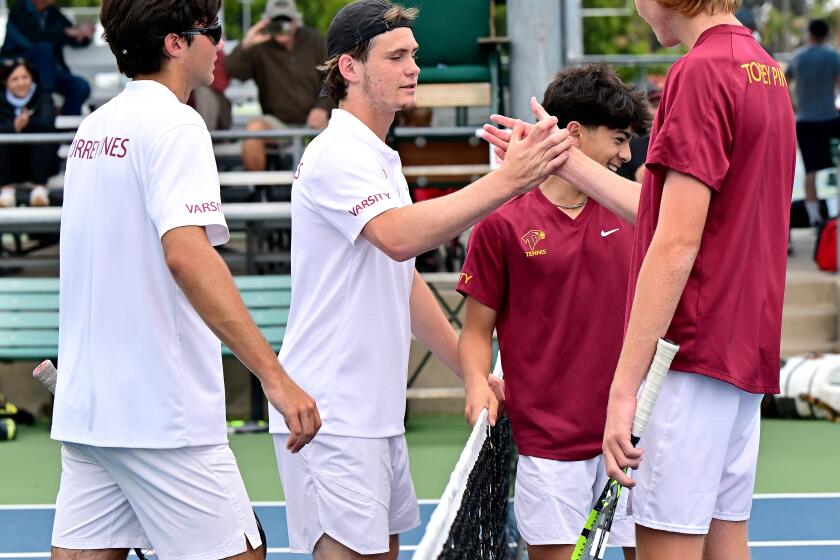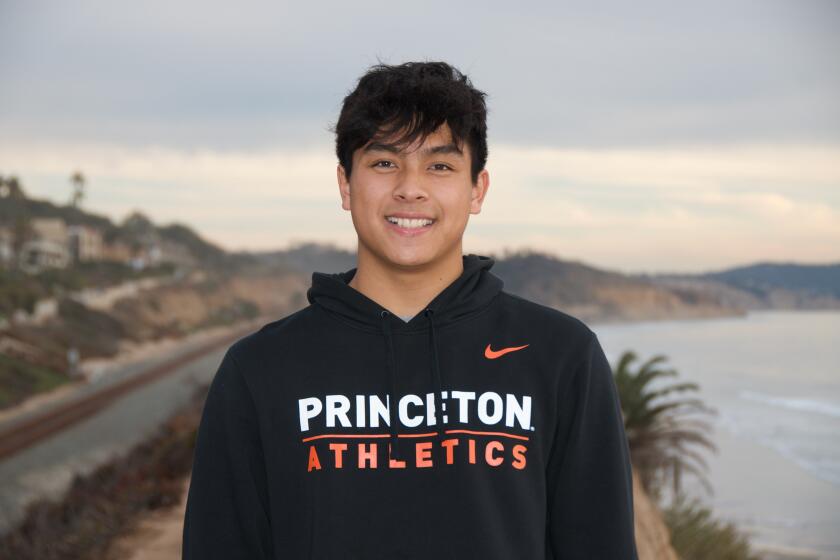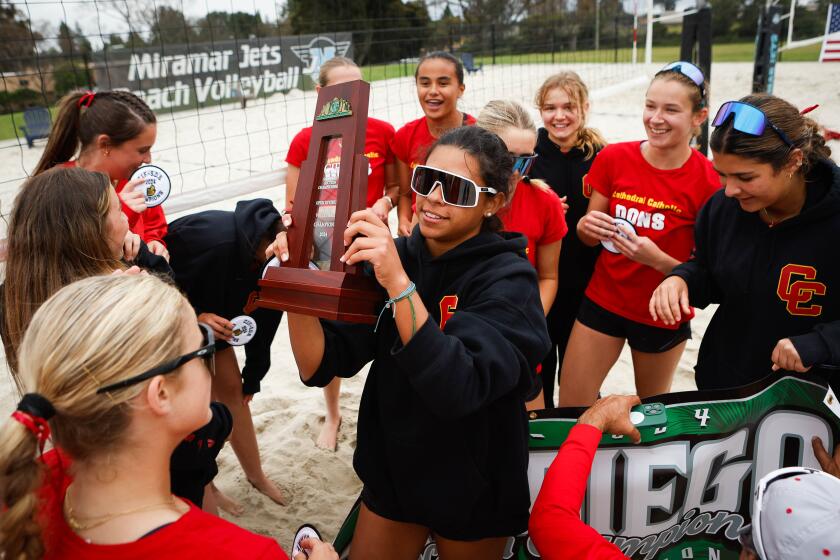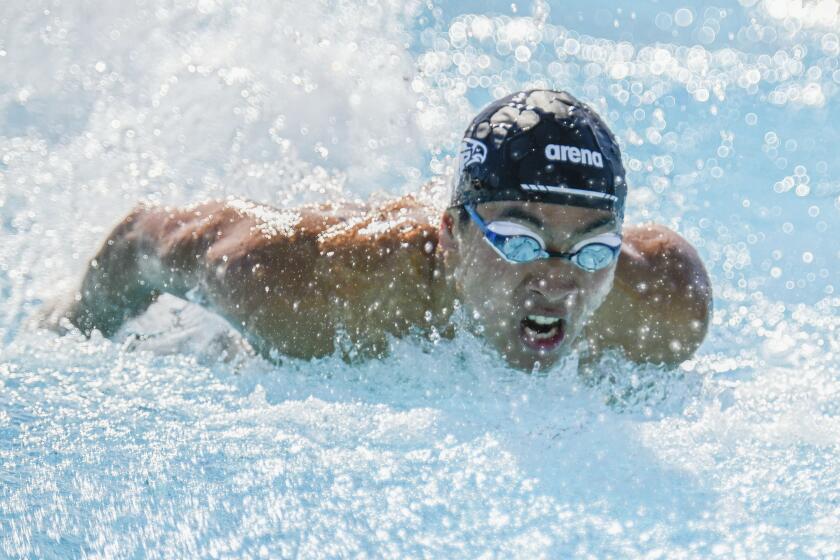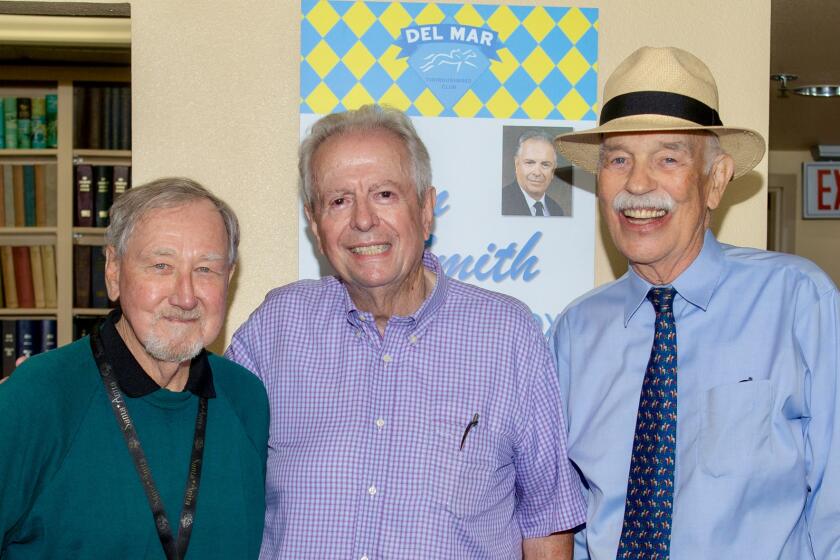Paulson off to outstanding start as Dodger Minor Leaguer

To say that the last two months have been a whirlwind for former Santa Fe Christian baseball standout Dillon Paulson would be an understatement. Finals for his spring classes at USC ended May 9, his junior season for the Trojans concluded with a May 26 victory over Cal State Northridge, he was selected in the 13th round of the Major League Baseball draft by the Los Angeles Dodgers on June 6 and turned 21 four days later.
The day after his birthday, Paulson got on a Phoenix-bound plane for a six-day Dodger mini-camp and on June 18 flew to Utah where he would join his new team, the Ogden Raptors, which had already started its season in the eight-team rookie level Pioneer League (South Division). Now, barely a month later, the 6-3, 200-lb. first baseman out of San Marcos is already making his presence felt despite the flurry of changes in his life.
After his first 16 games at Ogden, Paulson was hitting a highly-respectable .316 with a .425 on-base percentage, was tied for the league lead with four home runs and had driven in a team best 19 runs. The Raptors were also at the top of the Pioneer League South standings. All of that came on the heels of a solid collegiate career at USC for Head Coach Dan Hubbs. He was named honorable mention All-Pac-12 his final season after piling up 10 homers and topping the Trojans with 41 RBIs. As a prep, in his three years on the varsity under Head Coach Don Mitchell at Santa Fe Christian, the Eagles won a pair of league championships and twice earned CIF Playoff berths.
Recently, this newspaper caught up with Paulson during a break in the Ogden schedule. In that session, he talked about the draft process, the difference between the minor leagues and college ball and the preparation he received at Santa Fe Christian and USC.
Q: Did you know prior to the draft that the Dodgers were going to select you?
PAULSON: I had a hope. You never know in those situations, but we had talked a little bit the night before and generally agreed to terms so it was a matter of them actually taking me. They offered to pay for the remaining three semesters of my schooling at USC which was really important to me.
Q: How did you find out that you had been officially been drafted?
PAULSON: They had told me they would probably pick me in the late teens. My mom and I were downstairs watching on my laptop. It popped up on her i-Pad first—she screamed and started crying.
The Dodgers’ area scout, Dennis Moeller, called me a minute or two later to congratulate me on being a Dodger. Then my phone started blowing up. I called my dad, who was out-of-town. He grew up a Dodger fan so that meant a lot to him. Team reps called me later in the week to go over details.
Q: What’s your living situation in Ogden?
PAULSON: I’m staying with a host family, just like in summer ball during college. That’s the way it typically is until you reach the “High A” level.
Q: How do you like what you’ve been able to do performance-wise in the first few weeks?
PAULSON: It’s been exciting. I’ve been barreling the ball well, driving in runs and we’ve been winning games so it’s been a lot of fun.
It’s enjoyable to hit here—the elevation and temperature are high so the ball really jumps and I’m getting a lot of fastballs.
Q: From a competitive standpoint, what differences have you noticed between college and this professional level?
PAULSON: From a hitter’s perspective, the velocity is better but the command is not as good. As I mentioned, the pitchers throw a high percentage of fastballs. In college, it didn’t really matter what the count was, you would see a lot of off-speed pitches. In our recent series against Grand Junction, I saw maybe three-or-four off speed pitches in four games.
Q: What else is new for you in this environment?
PAULSON: We’re able to have a lot more time on the field, there are more coaches and, with the Dodgers, it seems like everything we do, we get a lot more done in a lot less time.
In college, we were limited to four coaches and 20 hours per week. With 35 guys on the roster and just three hours per day with everyone together, it’s tough to be efficient. Here, we have six coaches who are able to better separate the players and get the work that we need done in a relatively small amount of time.
Q: What is the team’s approach in terms of balancing player development and winning?
PAULSON: Winning does matter—there are playoffs and everything—but player development is most important.
Every game day, a select group of players does early work on the field. A hitting coach will work with you to make minor tweaks that get you in a better place to succeed. Then pre-game, everyone gets their turns in the cage and you can work on those tweaks and eventually put them into practice in the games.
Q: Have the Dodgers given you any indication of what plans and expectations they have for you?
PAULSON: They haven’t really said much. I think that talk comes more after spring training next year when they’ll have seen me play and had plenty of hands-on time with me.
Q: A lot of players get drafted and head to the minor leagues straight out of high school. Are you happy with the decision to play college ball at USC first?
PAULSON: I’ve thought about that a lot. Coming out of high school, I would not have been ready—not been ready to fail. College put things in perspective for me about how hard I would have to work to get the things I wanted—it was all on me.
My freshman and sophomore years at USC, I did not work as hard as I could have and it showed on the field. My junior year, I dedicated myself to baseball. That showed too.
Q: What was the most important thing your coaches at both Santa Fe Christian and USC did to prepare you for moving forward?
PAULSON: At SFC, Don Mitchell was a good baseball coach but was also a very strong Christian man and made that an emphasis. He prepared me to be respectful and live my life a certain way—a correct way. He also made school a priority and helped prepare me for that.
At USC, they lit a fire under my butt. My first two years there were not successful and they let me know about it. They basically told me to come back and work my butt off or leave. They motivated me to be the player that I wanted to be and that they wanted me to be. They stuck with me. In high school, I always got by on talent and didn’t work as hard as I should have. They changed that.
Q: As a native Southern Californian, how do you like living in Odgen?
PAULSON: Ogden is absolutely gorgeous. The backdrop in our stadium is unbelievable. At sunset, the (Wasatch) mountains turn purple and we have these lightning storms that are beautiful. It’s a great place but, man, I miss the beach.
Q: Your dad, Dennis, was a world-class golfer and winner on the PGA tour. Given your current position, how helpful do you feel it was to have someone like that in your life?
PAULSON: It was incredibly beneficial. He’s a guy who knows what it takes to get to this level, how badly you need to want it and how important it is to keep grinding.
At a young age, he always told me I had to work harder. It seems it took me until I got to USC to find out how truly right he was. He always stuck with me though.
Q: How do you envision this journey unfolding?
PAULSON: Honestly, I have no idea and there’s no timeline. Some of it is out of my control. I’m just going to go out, work hard and play my game. If I get moved up fast, good for me. If it doesn’t happen the way I hope, I’ll just keep giving it my best. That’s all I can control.
Get the Del Mar Times in your inbox
Top stories from Carmel Valley, Del Mar and Solana Beach every Friday for free.
You may occasionally receive promotional content from the Del Mar Times.
